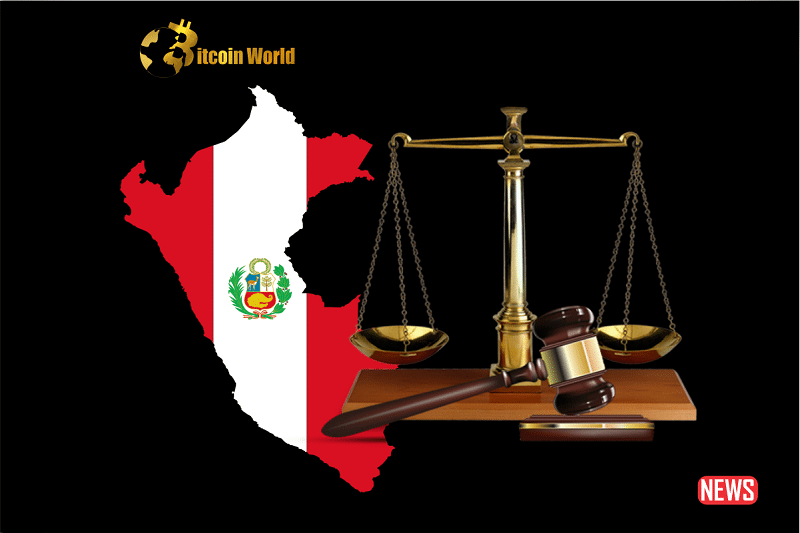Heads up, crypto enthusiasts and compliance aficionados! Peru has just dropped a significant regulatory bombshell. Worried about dirty money and terrorist financing sneaking into the crypto space? The Peruvian government certainly is, and they’re taking decisive action.
Why the Sudden Move? Peru’s Push for Crypto AML Compliance
Let’s face it, the anonymity sometimes associated with cryptocurrencies can be a double-edged sword. While it offers privacy for legitimate users, it can also be a haven for illicit activities. To combat this, Peru’s presidency has issued a new decree mandating that all cryptocurrency exchanges operating within the country must adhere to strict anti-money laundering (AML) regulations. Think of it as a digital handshake ensuring everyone playing in the crypto sandbox is doing so responsibly.
Who’s Affected? Introducing Peru’s Virtual Asset Service Providers (VASPs)
This isn’t just about the big exchanges. The decree casts a wide net, defining “Virtual Asset Service Providers” (VASPs) quite comprehensively. So, who exactly needs to pay attention?
- Any individual or company facilitating the exchange of virtual assets for traditional currencies (think exchanging Bitcoin for Peruvian Sol).
- Those involved in transferring different types of virtual assets.
- Entities offering custody and administration services for your digital coins.
- Anyone providing financial services related to the sale or offering of virtual assets.
The key takeaway? If your business touches cryptocurrency in Peru, you’re likely on the list.
The Mandate: Reporting to the Financial Intelligence Unit (UIF-Peru)
So, what are these VASPs required to do? The core of the new regulation involves reporting crucial information to the Financial Intelligence Unit of Peru (UIF-Peru). Consider the UIF-Peru as the country’s financial watchdog, responsible for sniffing out suspicious financial activity related to money laundering and terrorism financing. VASPs will need to provide data that helps the UIF-Peru connect the dots and identify potential threats.
Following Global Standards: The FATF Connection and the “Travel Rule”
Peru isn’t acting in isolation here. A major driver behind this decree is aligning with the recommendations of the Financial Action Task Force (FATF), an international body setting global standards for combating money laundering and terrorist financing. A particularly important aspect is the implementation of the FATF’s “travel rule.” What does this mean for you?
- Know Your Customer (KYC) on Steroids: Exchanges will need to implement robust KYC procedures. Think of it as the digital version of showing your ID. They need to know who their customers are.
- Data Sharing is Key: The “travel rule” essentially requires exchanges to share certain customer information when transferring virtual assets above a certain threshold. This helps trace the flow of funds and identify suspicious patterns.
Expect more detailed guidelines from the UIF-Peru soon, providing clarity on the specifics of these obligations.
Not Everyone’s Happy: The Blockchain Association Voices Concerns
While the government frames this as a necessary step, not everyone is celebrating. The Blockchain & DLT Association of Peru (ABPE), a group passionate about the adoption of Bitcoin and blockchain technology, has raised concerns. Their main gripe? They claim they weren’t consulted during the drafting of this crucial regulation.
The ABPE’s Perspective:
- Lack of Inclusion: They feel the decree was developed in a vacuum, without considering the expertise and insights of the Peruvian crypto community.
- Call for Dialogue: The ABPE is urging the Peruvian Congress to open a dialogue with representatives from the cryptocurrency ecosystem. They believe a more inclusive approach will lead to more balanced and effective regulations.
- Balancing Innovation and Regulation: Their core concern is ensuring that regulations don’t stifle innovation while addressing legitimate risks.
It’s a classic case of balancing security with fostering technological advancement. Can Peru strike the right chord?
The Bigger Picture: A Global Trend in Crypto Regulation
Peru’s move isn’t happening in a vacuum. Across the globe, governments are grappling with how to regulate cryptocurrencies. The decentralized and often pseudonymous nature of these digital assets presents unique challenges. Peru’s decision to tighten regulations and bring exchanges under the AML umbrella reflects a growing global trend. Countries are recognizing the potential risks and are actively seeking ways to safeguard their financial systems while still allowing for innovation.
What’s Next for Peru’s Crypto Scene?
This new decree marks a significant step in Peru’s efforts to combat financial crime and protect its economy from potential cryptocurrency-related risks. Here’s what to watch out for:
- UIF-Peru’s Detailed Guidelines: The specifics of implementation will be crucial. Keep an eye out for the detailed guidelines expected from the UIF-Peru.
- Industry Response: How will cryptocurrency exchanges and other VASPs in Peru adapt to these new regulations? Will there be consolidation? Will some players exit the market?
- Legislative Developments: Will Congress heed the ABPE’s call for dialogue? Could we see further amendments or new legislation in the future?
In Conclusion: Navigating the Evolving Crypto Landscape in Peru
Peru’s new AML regulations for cryptocurrency exchanges signal a clear intention to bring greater oversight to the digital asset space. While welcomed by some as a necessary step to protect the financial system, it has also sparked debate about the level of industry consultation. The coming months will be crucial in observing how these regulations are implemented, the impact they have on the Peruvian cryptocurrency ecosystem, and whether a balance can be struck between security and fostering innovation. One thing is certain: the regulatory landscape for cryptocurrencies is constantly evolving, and Peru’s recent move is a testament to that dynamic.
Disclaimer: The information provided is not trading advice, Bitcoinworld.co.in holds no liability for any investments made based on the information provided on this page. We strongly recommend independent research and/or consultation with a qualified professional before making any investment decisions.




